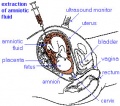File:Amniocentesis.jpg: Difference between revisions
From Embryology
No edit summary |
No edit summary |
||
| Line 1: | Line 1: | ||
Amniocentesis | ==Amniocentesis== | ||
Amniocentesis is a prenatal diagnostic test carried out mainly between 14th to 18th week of pregnancy. | Amniocentesis is a prenatal diagnostic test carried out mainly between 14th to 18th week of pregnancy. | ||
| Line 5: | Line 5: | ||
Amniotic fluid is taken from the uterus, sent to a diagnostic laboratory and embryonic cells isolated from the amniotic fluid. | Amniotic fluid is taken from the uterus, sent to a diagnostic laboratory and embryonic cells isolated from the amniotic fluid. | ||
No anaesthetic is required, and a result is usually obtained in about three to four weeks. When the test is carried out by an obstetrician experienced in the technique, the risk of a miscarriage related to the test is about 1 %. | No anaesthetic is required, and a result is usually obtained in about three to four weeks. When the test is carried out by an obstetrician experienced in the technique, the risk of a miscarriage related to the test is about 1 %. | ||
Modified from: Checking your baby's health before birth. State Health Publication Number (PA) 94-090. | |||
:'''Links:''' [[Amniocentesis]] | [[Prenatal Diagnosis]] | |||
{{Template:Prenatal diagnosis}} | {{Template:Prenatal diagnosis}} | ||
[[Category:Abnormal Development]] [[Category:Genetic Abnormalities]] [[Category:Human Embryo]] [[Category:Human Fetus]] | [[Category:Abnormal Development]] [[Category:Genetic Abnormalities]] [[Category:Human Embryo]] [[Category:Human Fetus]] | ||
Revision as of 10:54, 18 August 2011
Amniocentesis
Amniocentesis is a prenatal diagnostic test carried out mainly between 14th to 18th week of pregnancy.
Amniotic fluid is taken from the uterus, sent to a diagnostic laboratory and embryonic cells isolated from the amniotic fluid.
No anaesthetic is required, and a result is usually obtained in about three to four weeks. When the test is carried out by an obstetrician experienced in the technique, the risk of a miscarriage related to the test is about 1 %.
Modified from: Checking your baby's health before birth. State Health Publication Number (PA) 94-090.
- Links: Amniocentesis | Prenatal Diagnosis
File history
Click on a date/time to view the file as it appeared at that time.
| Date/Time | Thumbnail | Dimensions | User | Comment | |
|---|---|---|---|---|---|
| current | 09:34, 28 March 2010 |  | 284 × 250 (31 KB) | S8600021 (talk | contribs) | Amniocentesis Amniocentesis is a prenatal diagnostic test carried out mainly between 14th to 18th week of pregnancy. Amniotic fluid is taken from the uterus, sent to a diagnostic laboratory and embryonic cells isolated from the amniotic fluid. No anaes |
You cannot overwrite this file.
File usage
The following 24 pages use this file:
- 2010 BGD Tutorial - Applied Embryology and Teratology
- 2010 Foundations Lecture - Introduction to Human Development
- 2011 Group Project 4
- ANAT2341 Lab 4 - Abnormal Placenta
- Amniocentesis
- BGDA Practical Placenta - Diagnostic Techniques
- BGDB Gastrointestinal - Activity 4
- BGDB Gastrointestinal - Fetal
- BGD Tutorial - Applied Embryology and Teratology
- Fetal Surgery
- Foundations Lecture - Introduction to Human Development
- Foundations Practical - Additional Resources
- Human Abnormal Development
- Learning and Teaching Forum 2014 - Personalised Learning
- Monosomy
- Neonatal Diagnosis
- Placenta - Membranes
- Pre-Medicine Program - Embryology
- Prenatal Diagnosis
- Prenatal Genetic Diagnosis
- Sandbox
- Science Student Projects
- Trisomy X
- Talk:2011 Group Project 4